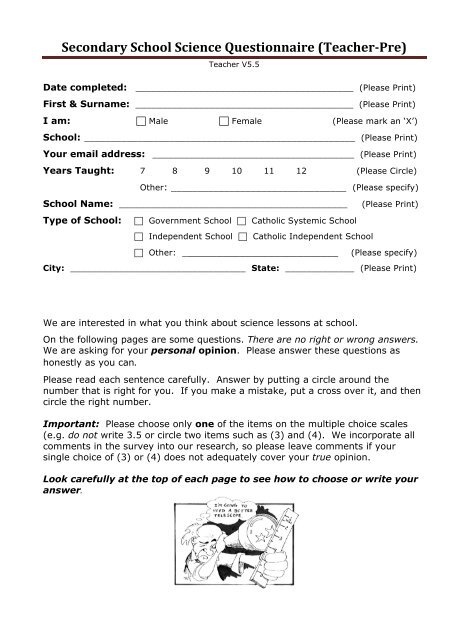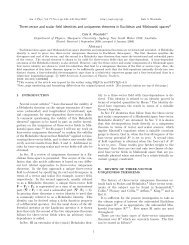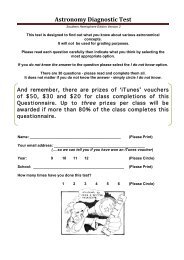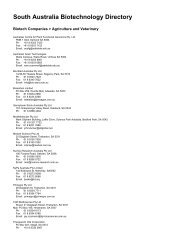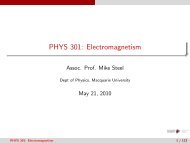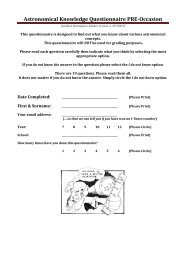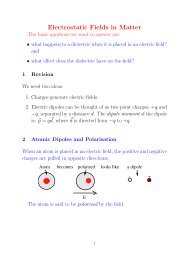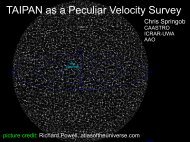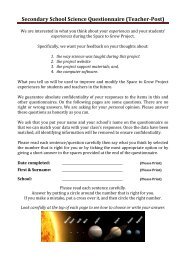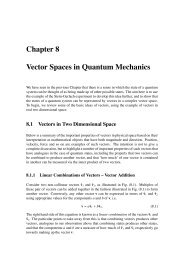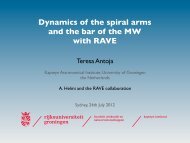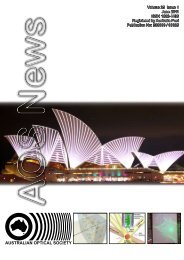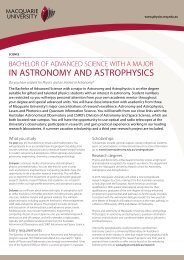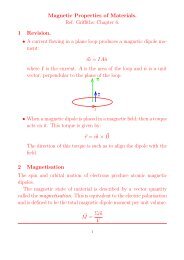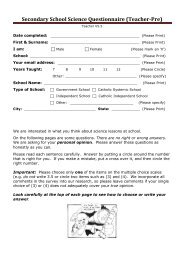Secondary School Science Questionnaire (Teacher-âPre)
Secondary School Science Questionnaire (Teacher-âPre)
Secondary School Science Questionnaire (Teacher-âPre)
- No tags were found...
Create successful ePaper yourself
Turn your PDF publications into a flip-book with our unique Google optimized e-Paper software.
<strong>Secondary</strong> <strong>School</strong> <strong>Science</strong> <strong>Questionnaire</strong> (<strong>Teacher</strong>-‐Pre) For each question, mark an ‘X’ in the box or write where appropriate1) What is your age? 552) What position do you hold on the staff? Principal Deputy Principal / Assistant Principal Classroom <strong>Teacher</strong> Head of Department / Subject Co-ordinator3) On what basis are you employed? Full time permanent Part time permanent Casual/Relief <strong>Teacher</strong> Temporary/short term contract4) Please advise information on science qualification(s), if any, you hold. Bachelor of <strong>Science</strong> Bachelor of <strong>Science</strong> (Honours) Bachelor of Applied <strong>Science</strong> Bachelor of Ed. with integrated <strong>Science</strong> degree Bachelor of Engineering Graduate Certificate in <strong>Science</strong> Diploma of <strong>Science</strong> Post Graduate Research (Masters or PhD) Non-Research Masters Other ________________________________5) Describe the following features of your science degrees (if multiple, pleaseprovide clarification)Major study area/s _______________________________________________________Minor study area/s _______________________________________________________University ________________________________ Graduation Year _______________6) Please provide information on the teaching qualifications you hold. Bachelor of Education Diploma of Education Graduate Certificate of Education Master of Education, non-Research Master of Education, Research Master of Teaching, non-Research Doctor of Philosophy Other ________________________________University _______________________________ Graduation Year _________________7) Describe the following features of your teaching degrees (if multiple, pleaseprovide clarification)Major study area/s _______________________________________________________Minor study area/s _______________________________________________________University ________________________________ Graduation Year ________________8) Please provide information on other tertiary degrees, diplomas or certificatesthat you hold.______________________________________________________________________________________________________________________________________________Page 2 Tpre5.5
<strong>Secondary</strong> <strong>School</strong> <strong>Science</strong> <strong>Questionnaire</strong> (<strong>Teacher</strong>-‐Pre) 9) How many years have you been teaching secondary science, includingtemporary employment? 25 years10) How long have you been teaching at this school? 25 years11) Which science courses are you formally qualified to teach? Please mark ‘X’ to allthat apply) Junior <strong>Science</strong> Senior Physics Senior Chemistry Senior Biology Senior Multi-strand Earth and Environmental <strong>Science</strong> None Other: _____________________________ (please specify)12) Please advise the science subjects you’ve actually taught in the last 6 years– if insufficient space, please add details on a separate page.Name of Course/Subject Grade Level of Students Year(s) TaughtExample: Biology Grade 11 2009 and 201013) Have you undertaken any formal units at university/course/professionaldevelopment activities in astronomy? (If Yes, please tell us what you have done) Yes No ______________________________________________________________________________________________________________________________14) Please rate each item with an ‘X’ for its availability at your school.Material resources and support personnel availability Never Seldom Usually AlwaysWell equipped science laboratoriesSufficient laboratory consumablesSuitable laboratory assistant(s)Suitable AV equipmentSuitable computer resources for teacher useAppropriate number of computers for student useA reliable Internet connectionA fast Internet connection (>1 Megabit/second)Suitably skilled ICT support staffOther computing hardware for teaching and learning sciencePage 3 Tpre5.5
<strong>Secondary</strong> <strong>School</strong> <strong>Science</strong> <strong>Questionnaire</strong> (<strong>Teacher</strong>-‐Pre) 15) How many computers are in a typical science lab at your school? _____16) Please comment on your school’s type of Internet connection, quality ofconnection and any other issues that you may have with ICT access and use.______________________________________________________________________________________________________________________________________________How often do these things happen in your science class?17) As a science teacher I … Never Once aterm orlessAboutonce amonthAboutonce aweektell students how to improve their work. 1 2 3 4 5give students quizzes that they self-correct so that they cansee how they are going.talk to students and give them feedback on how they aregetting on in science.Nearlyeverylesson1 2 3 4 51 2 3 4 5allow students to choose their own topics to investigate 1 2 3 4 518) In my science class …students copy notes that I give them. 1 2 3 4 5I give my students the opportunity to work out explanationsin science individually.I give my students the opportunity to work out explanationsin science with peers.I provide opportunities for my students to explain theirideas.1 2 3 4 51 2 3 4 51 2 3 4 5my students read a science textbook. 1 2 3 4 5I demonstrate experiments. 1 2 3 4 5I give instructions to my students to follow when completingexperiments.1 2 3 4 5I allow students to plan and do their own experiments. 1 2 3 4 5I provide opportunities for class discussions. 1 2 3 4 5I provide learning experiences for students to learn aboutscientists and what they do.1 2 3 4 5students work in groups. 1 2 3 4 5students use computers to do science work. 1 2 3 4 5students look for information on the Internet at school. 1 2 3 4 5students investigate to see if their ideas are right. 1 2 3 4 5Page 4 Tpre5.5
<strong>Secondary</strong> <strong>School</strong> <strong>Science</strong> <strong>Questionnaire</strong> (<strong>Teacher</strong>-‐Pre) Indicate how often these things happen in your science class by writingan appropriate number in the space provided, or circle as required.18) In my science class, I plan for students to…participate in practical work outside the classroom e.g.schoolyard, other outdoor areas, library or computer lab.have excursions to the museum, science centre,Questacon or similar places.listen to visiting speakers who talk to them about science._______________day(s)a term.day(s)a term.day(s)a term.__________________day(s)a yearday(s)a yearday(s)a year19) As a science teacher I… (please circle one each)Never Once atermor lessAboutonce amonthAbout Nearlyonce a everyweek lessonmark students’ work and give it back quickly 1 2 3 4 5make it clear what students have to do to get good marks 1 2 3 4 5use language that students easily understand 1 2 3 4 5take notice of students’ ideas 1 2 3 4 5show students how new work relates to what we havealready done.1 2 3 4 520) During science lessons I feel students…Never Once atermor lessAboutonce amonthAbout Nearlyonce a everyweek lessonget excited about what we do. 1 2 3 4 5have enough time to think about what we are doing. 1 2 3 4 5are curious about the science we do. 1 2 3 4 5are bored. 1 2 3 4 5don’t understand the science we do. 1 2 3 4 5find science too easy. 1 2 3 4 5find science challenging. 1 2 3 4 5think science is too hard. 1 2 3 4 521) The science I teach at school …AlmostneverSometimesOftenVeryoftenis relevant to my students’ future. 1 2 3 4 5Is useful in my students’ every day life. 1 2 3 4 5deals with things that my students are concerned with. 1 2 3 4 5helps my students make decisions about their health. 1 2 3 4 5helps my students understand environmental issues. 1 2 3 4 5AlmostalwaysPage 5 Tpre5.5
<strong>Secondary</strong> <strong>School</strong> <strong>Science</strong> <strong>Questionnaire</strong> (<strong>Teacher</strong>-‐Pre) 23) To what extent do you agree with thefollowing statements?StronglydisagreeDisagree SometimesAgree StronglyagreeI enjoy science in general. 1 2 3 4 5I enjoy science teaching. 1 2 3 4 5I enjoy the science I teach at this school. 1 2 3 4 5(If applicable) I enjoy the science in Space to Grow materialsthat I am planning on teaching for that unit in my class/es.1 2 3 4 524) A science teacher has many tasks to perform, many roles to fulfill and manypressures placed upon them. Below are only five of these roles. We are interested in yourperception of these tasks/roles/pressures. All are important facets of a teacher’s job.From your perspective, please rank them in order from 1 to 5 in level of personalimportance from your perception as a science teacher.My role as a science teacher is to … (Please rank 1 as highest to 5 as lowest) teach students. report student outcomes to relevant stakeholders. facilitate students learning. assess students’ learning outcomes. help students understand science.25) In my science class, I really like the way I … (Please ‘X’ to all that apply) incorporate practical work. demonstrate experiments. incorporate group work. relate scientific content to students’ everyday life promote class discussion. facilitate scientific inquiry. incorporate technology. cater for individual differences. allow students to conduct their own investigations. Other: __________________________________________________________________________________________________________________________(Please Specify)Page 6 Tpre5.5
<strong>Secondary</strong> <strong>School</strong> <strong>Science</strong> <strong>Questionnaire</strong> (<strong>Teacher</strong>-‐Pre) 26) What are the things, if any, that you don’t like about the way you teach andthe way students learn in your science class? (Please mark ’X’ to all that apply) Lessons are too teacher-directed. Little time for preparation. Limited amount of time to cover the scientific content. Lessons mainly involve students copying notes Lack of resources/equipment. Insufficient facilities for conducting practical work. Limited access to technology. Little opportunity for outside experiences (e.g. excursions) Lack of resources/equipment. The theory-laden way in which the scientific content is covered. The focus placed on assessment and meeting assessment deadlines. My lack of content/background knowledge in some science topics I teach. My lack of confidence in using technology in science classes. Student behavior problems that have to be dealt with in lessons. Other: ___________________________________________(Please Specify)27) My science class could be improved by … (Please mark ’X’ to all that apply) making lessons more student-centered. having access to more resources/equipment. incorporating more group work. having better access to, and use of, technology. incorporating more practical work. having more time to cover the scientific content. having smaller class sizes. incorporating more inquiry-based lessons. having more time for lesson preparation. having more opportunities for teacher professional development. making the science content more relevant to students’ everyday life. Other: ____________________________________________________________________________________________________________ (Please Specify)Page 7 Tpre5.5
<strong>Secondary</strong> <strong>School</strong> <strong>Science</strong> <strong>Questionnaire</strong> (<strong>Teacher</strong>-‐Pre) 28) I think the declining number of students pursuing the sciences in Years 11and 12 and beyond is related to … (Please mark ’X’ to all that apply) the lack of relevance to students. the perceived difficulty associated with science subjects. the lack of well paid jobs in science (little financial reward). the fact that there are more options for students in terms of subject selection. stereotypes associated with scientists and science subjects (e.g., science is for nerds). a negative experience in Year 7-10 science (found science boring). the low profile science has in society. gender differences in subject selection (fewer females selecting science subjects). Other: _____________________________________________________________________________________________________________(Please Specify)29) At your school, approximately what number of Year 10 students selectPhysics as one of their Year 11 subjects? (Please mark with an ‘X’) 40 students30) Approximately what percentage does the number of students selectingPhysics in Year 11 from question 29 represent? (Please mark with an ‘X’) = 60% representation of the whole Year 10 cohort at my schoolThank you for filling in this questionnaire! Page 8 Tpre5.5


